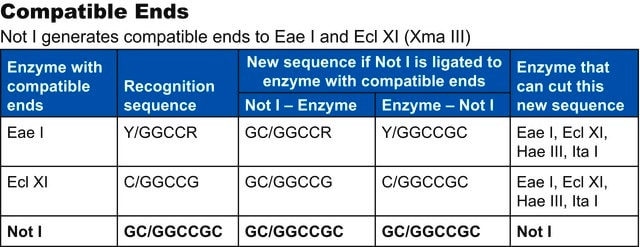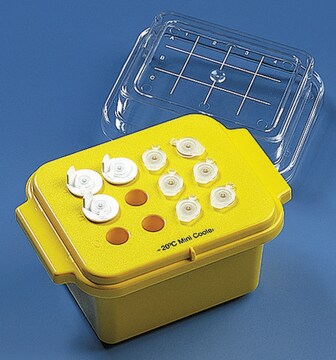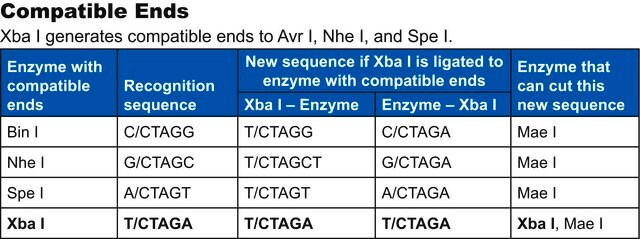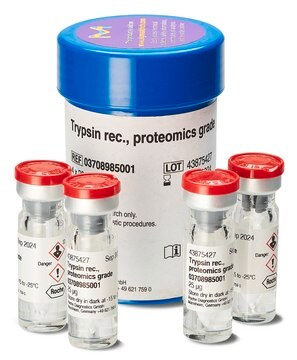BLNI-RO
Roche
Bln I (Avr II)
from Brevibacterium linens
About This Item
Produtos recomendados
fonte biológica
bacterial (Brevibacterium linens)
Nível de qualidade
forma
solution
atividade específica
10000 U/mL
embalagem
pkg of 1,000 U (11558170001 [10 U/μl])
pkg of 200 U (11558161001 [10 U/μl])
fabricante/nome comercial
Roche
Parâmetros
37 °C optimum reaction temp.
cor
colorless
pH
8.1 (39 °F)
solubilidade
water: miscible
adequação
suitable for molecular biology
aplicação(ões)
life science and biopharma
sample preparation
atividade externa
Endonucleases, none detected (up to 20 U with MWM II-DNA)
Endonucleases, none detected (up to 20U with pBR 322-DNA)
Condições de expedição
dry ice
temperatura de armazenamento
−20°C
Descrição geral
Compatible ends
Bln I ends are compatible with ends generated by Nhe I, Spe I and Xba I.
Isoschizomers
Bln I is an isoschizomer of Avr II.
Note: The complete 13 site Avr II restriction map of the E.coli genome has been reported.
Methylation sensitivity
The enzyme is not known to be affected by methylation.
Especificidade
CCTAGG
Restriction site: C↓CTAGG
C↓CTAGG
Heat inactivation: No inactivation of Bln I after incubation at 65 °C for 15 minutes.
Qualidade
1 μg λDNA is incubated for 16 hours in 50 μl SuRE/Cut Buffer H with an excess of Bln I. The number of enzyme units which do not change the enzyme-specific pattern is stated in the certificate of analysis.
Absence of exonuclease activity
Approximately 5 μg [3H] labeled calf thymus DNA are incubated with 3 μl Bln I for 4 hours at +37°C in a total volume of 100 μl 50 mM Tris-HCl, 10 mM MgCl2, 1 mM Dithioerythritol, pH approximately 7.5. Under these conditions, no release of radioactivity is detectable, as stated in the certificate of analysis.
Typical ligation and recutting assay
Bln I fragments obtained by complete digestion of 1 μg λ × EcoR I DNA ligated for 16 hours at +4°C with 1 U T4 DNA Ligase in 10 μl buffer that contains 66 mM Tris-HCl, 5 mM MgCl2, 5 mM Dithiothreitol, 1 mM ATP, pH 7.5 (at +20°C). The percentages of product that can be ligated and subsequently recut with Bln I and EcoR I (yielding the typical pattern of λ × EcoR I × Bln I fragments) are stated under "Lig" and "Rec" in the certificate of analysis.
Perfil do DNA
- λ: 2
- φX174: 0
- Ad2: 2
- M13mp7: 0
- M13mp18:0
- pBR322: 0
- pBR328: 0
- pUC18: 0
- SV40: 2
Definição da unidade
Armazenamento e estabilidade
Nota de análise
Bln I has been tested in Pulsed-Field Gel Electrophoresis (on bacterial chromosomes). For cleavage of genomic DNA (E.coli C 600) embedded in agarose for PFGE analysis, we recommend using 10 U of enzyme/μg DNA and 4 hour incubation.
The buffer in bold is recommended for optimal activity
- A: 25-50%
- B: 50-75%
- H: 100%
- L: 0-10%
- M: 25-50%
Outras notas
Somente componentes do kit
- Enzyme Solution
- SuRE/Cut Buffer H 10x concentrated
Código de classe de armazenamento
12 - Non Combustible Liquids
Classe de risco de água (WGK)
WGK 1
Ponto de fulgor (°F)
does not flash
Ponto de fulgor (°C)
does not flash
Certificados de análise (COA)
Busque Certificados de análise (COA) digitando o Número do Lote do produto. Os números de lote e remessa podem ser encontrados no rótulo de um produto após a palavra “Lot” ou “Batch”.
Já possui este produto?
Encontre a documentação dos produtos que você adquiriu recentemente na biblioteca de documentos.
Os clientes também visualizaram
Artigos
The term “Restriction enzyme” originated from the studies of Enterobacteria phage λ (lambda phage) in the laboratories of Werner Arber and Matthew Meselson.
Conteúdo relacionado
Restriction endonucleases popularly referred to as restriction enzymes, are ubiquitously present in prokaryotes. The function of restriction endonucleases is mainly protection against foreign genetic material especially against bacteriophage DNA.
Nossa equipe de cientistas tem experiência em todas as áreas de pesquisa, incluindo Life Sciences, ciência de materiais, síntese química, cromatografia, química analítica e muitas outras.
Entre em contato com a assistência técnica









